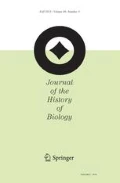Conclusion
In late September 1838, Darwin read Malthus's Essay on Population, which left him with “a theory by which to work.”115 Yet he waited some twenty years to publish his discovery in the Origin of Species. Those interested in the fine grain of Darwin's development have been curious about this delay. One recent explanation has his hand stayed by fear of reaction to the materialist implications of linking man with animals. “Darwin sensed,” according to Howard Gruber, “that some would object to seeing rudiments of human mentality in animals, while others would recoil at the idea of remnants of animality in man.”116 With this link closed, Darwin hung the materialist chain around his own neck, where it rested most uncomfortably. Stephen Gould, supporting Gruber's argument, finds evidence for this reconstruction in Darwin's M and N notebooks, which
include many statements showing that he espoused but feared to expose something he perceived as far more heretical than evolution itself: philosophical materialism-the postulate that matter is the stuff of all existence and that all mental and spiritual phenomena are its by-products. No notion could be more upsetting to the deepest traditions of Western thought than the statement that mind-however complex and powerful-is simply a product of brain.117
The proferred hypothesis suggests, then, that Darwin was acutely sensible of the social consequences of equating men with animals and therefore mind with brian, and that he thus shied from publically revealing his views until the intellectual climate became more tolerant.
The history I have examined makes this hypothesis implausible. Even if Darwin warily explored the implications of his emerging theory in his notebooks, his subsequent study of Fleming, Wells, Brougham, and Kirby should have quieted any trepidation. If these natural theologians did not flinch at seeing human reason prefigured in the mind of a worm, should Darwin have? Moreover, he recognized in his M notebook that the thesis of evolutionary continuity between men and animals did not require an explicit avowal of his conviction that brain was the agent of thought.118 And in any case, his materialism was of a rather benign sort; at least he so expressed it in an annotation in Abercrombie's Inquiries concerning the Intellectual Powers (1838): “By materialism I mean, merely the intimate connection of thought with form of brain — like kind of attraction with nature of element.”119 This belief would have held little terror for British intellectuals, who were quite familiar — some even comfortable-with Locke's anti-Cartesian argument that there was nothing contradictory in supposing God could make matter to think.120 Finally, even if the intellectual atmosphere of early nineteenth-century Britain were inhospitable to Darwin's brand of materialism, there is little reason to believe he breathed a different air at mid-century while preparing his manuscript.
That Darwin should not have feared suspicions of materialism, of course, does not mean that he did not. But I think there were other, more persistent sources of anxiety that kept him from rushing to publish: namely, the several conceptual obstacles he had to overcome if his theory of evolution by natural selection were to be made scientifically acceptable. Prominent among these were the problems surrounding his changing notions of instinct.
The inertia of his older ideas about instinct at first made it hard for Darwin to gauge how far the theory of natural selection might be applied to behavior. By the early 1840s he finally felt ready to meet the challenge of the natural theologians by providing a naturalistic explanation for the wonderful instincts of animals. In his “Essays” of 1842 and 1844 one sort of instinct is, however, not considered-that of neuter insects. Yet Darwin seems to have appreciated the difficulties such instincts entailed at least by 1843, when he read Kirby and Spence. He simply required time to work out a solution to a problem he initially perceived as “fatal to my whole theory.” Even while writing the “Species Book” in the summer of 1857, he was still juggling several possible solutions compatible with natural selection. It was only a short time before he actually turned to work on the Origin of Species that he appears to have settled on a single explanation for the difficulties posed by the instincts of worker bees and ants. The force of his theory of community selection snapped the last critical support of the creationist hypothesis and, conveniently enough, also fractured the generalized Lamarckian account of the evolution of behavior. These results were worth waiting for.
Similar content being viewed by others
Author information
Authors and Affiliations
Rights and permissions
About this article
Cite this article
Richards, R.J. Instinct and intelligence in British natural theology: Some contributions to Darwin's theory of the evolution of behavior. J Hist Biol 14, 193–230 (1981). https://doi.org/10.1007/BF00141092
Issue Date:
DOI: https://doi.org/10.1007/BF00141092




